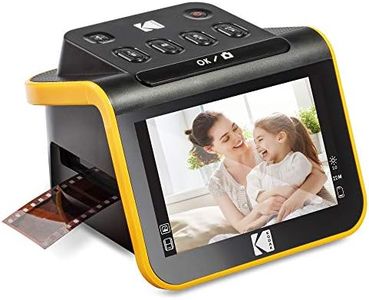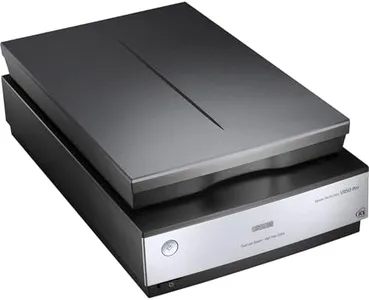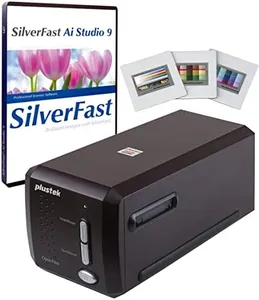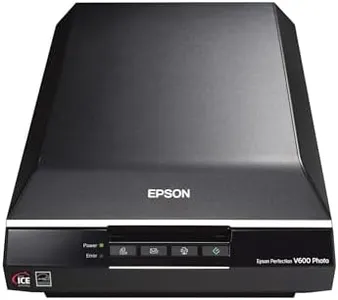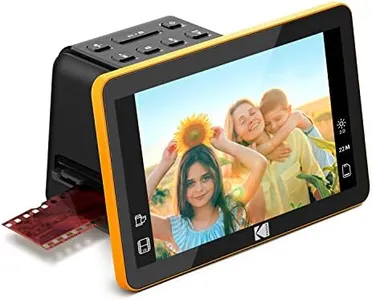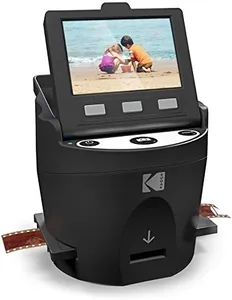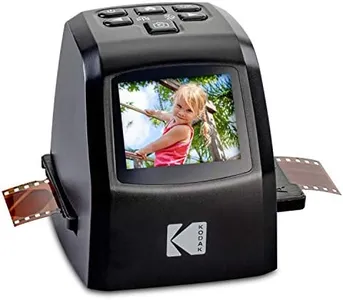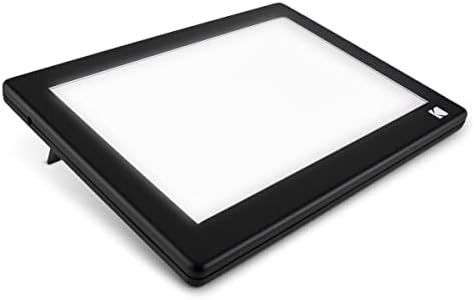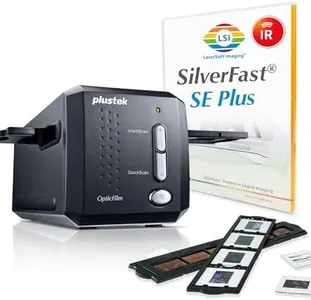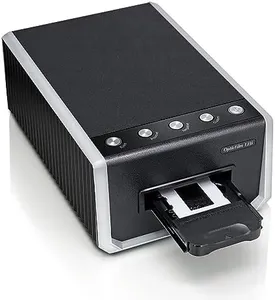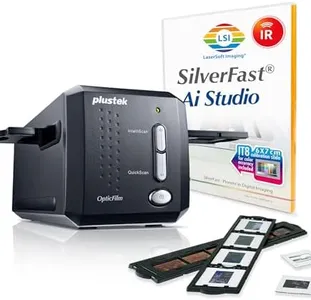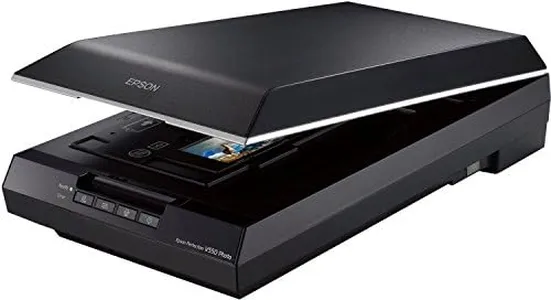10 Best Film Negative Scanners 2026 in the United States
Our technology thoroughly searches through the online shopping world, reviewing hundreds of sites. We then process and analyze this information, updating in real-time to bring you the latest top-rated products. This way, you always get the best and most current options available.

Our Top Picks
Winner
Epson Perfection V850 Pro scanner
Most important from
486 reviews
The Epson Perfection V850 Pro scanner is a high-quality device specifically designed for film-negative scanning. It boasts an impressive resolution of 6400 dpi, which ensures incredibly detailed scans. This level of resolution is ideal for professional photographers and enthusiasts who demand high precision in their scanned images.
Another standout feature is its 4.0 Dmax dynamic range, which allows for excellent gradations and fine shadow details, making it suitable for capturing the subtleties in film negatives. The scanner's dual lens system further enhances image quality by selecting the optimal lens for each scan, ensuring the best possible results. It supports a wide range of operating systems, including various versions of Windows and Mac OS X, making it versatile and accessible to a broad audience.
The scanner is relatively bulky and heavy, weighing 20.9 pounds and measuring 12.1 x 19.8 x 6 inches, which could be a drawback for users with limited space. Additionally, it utilizes USB connectivity, which is standard but may not offer the fastest transfer speeds compared to newer technologies. The software and features included with the scanner are designed to facilitate high-quality scans, although some users might find the setup process a bit complex. Despite these minor inconveniences, the Epson Perfection V850 Pro is best suited for professionals and serious hobbyists who need detailed and high-quality scans of film negatives.
Most important from
486 reviews
KODAK Slide N SCAN Film & Slide Scanner Digitizer with 5” LCD Screen, Quickly Convert Negatives & Slides to Digital 22MP JPEG Photos, Compatible with 135, 126 and 110 Film & Slides
Most important from
11785 reviews
The Kodak Slide N Scan Film and Slide Scanner is designed to help you preserve old photo memories by converting color and black & white negatives and slides into high-resolution digital files. With a resolution of 22 megapixels, it delivers clear and detailed images, making it suitable for most users who want to digitize their film collection. The large 5-inch LCD screen provides a convenient way to preview and edit photos, which is great for sharing with friends and family or using as a digital picture frame.
The scanner supports various film sizes including 35mm, 126, and 110 negatives and slides, making it versatile for different types of film media. Additionally, its easy-load film inserts and quick-feeding tray technology simplify the scanning process, allowing for efficient and continuous operation. The device also includes basic editing features with a single touch, such as adjusting color and brightness, which are user-friendly especially for those who are not tech-savvy.
It supports SD and SDHC cards up to 32GB, but these are not included, which might be an inconvenience for some users. Connectivity options like USB and HDMI provide flexibility in transferring scanned images to computers or viewing them on larger screens. The Kodak Slide N Scan is a solid choice for anyone looking to digitize their old film negatives and slides with minimal hassle.
Most important from
11785 reviews
Plustek OpticFilm 8300i Ai Film Scanner - Converts 35mm Film & Slide into Digital, Bundle SilverFast Ai Studio 9 + QuickScan Plus, Include Advanced IT8 Calibration Target (3 Slide)
Most important from
275 reviews
The Plustek OpticFilm 8300i Ai Film Scanner offers a high resolution of 7200 dpi, making it capable of producing detailed scans of 35mm film and slides. The inclusion of SilverFast Ai Studio 9 and QuickScan Plus software provides powerful tools for optimizing image quality and ease of use. The advanced IT8 calibration targets included in the bundle ensure accurate color reproduction and less interpolation, which is a significant advantage for those who prioritize color fidelity in their scans. The new generation chip improves scan speeds by 38%, making it a faster option compared to previous models, which can be beneficial for users who scan large quantities of film.
Additionally, the scanner supports a wide range of operating systems, including Windows and Mac OS, and offers USB connectivity for easy setup and use. However, the scanner's weight of 2.74 kilograms might make it less portable than other models, which could be a drawback for users who need to move it frequently. If you are looking for a film-negative scanner with high resolution, accurate color calibration, and strong software support, the Plustek OpticFilm 8300i Ai is a suitable option, with the primary consideration being its portability compared to competitors.
Most important from
275 reviews
Buying Guide for the Best Film Negative Scanners
Choosing the right film-negative scanner can be a bit overwhelming, but understanding the key specifications can help you make an informed decision. A film-negative scanner is a device that converts film negatives into digital images, allowing you to preserve and share your memories in a modern format. When selecting a scanner, consider what you need it for, such as the level of detail you want to capture, the types of film you have, and how you plan to use the digital images. Here are some key specifications to consider and how to navigate them.FAQ
Most Popular Categories Right Now
